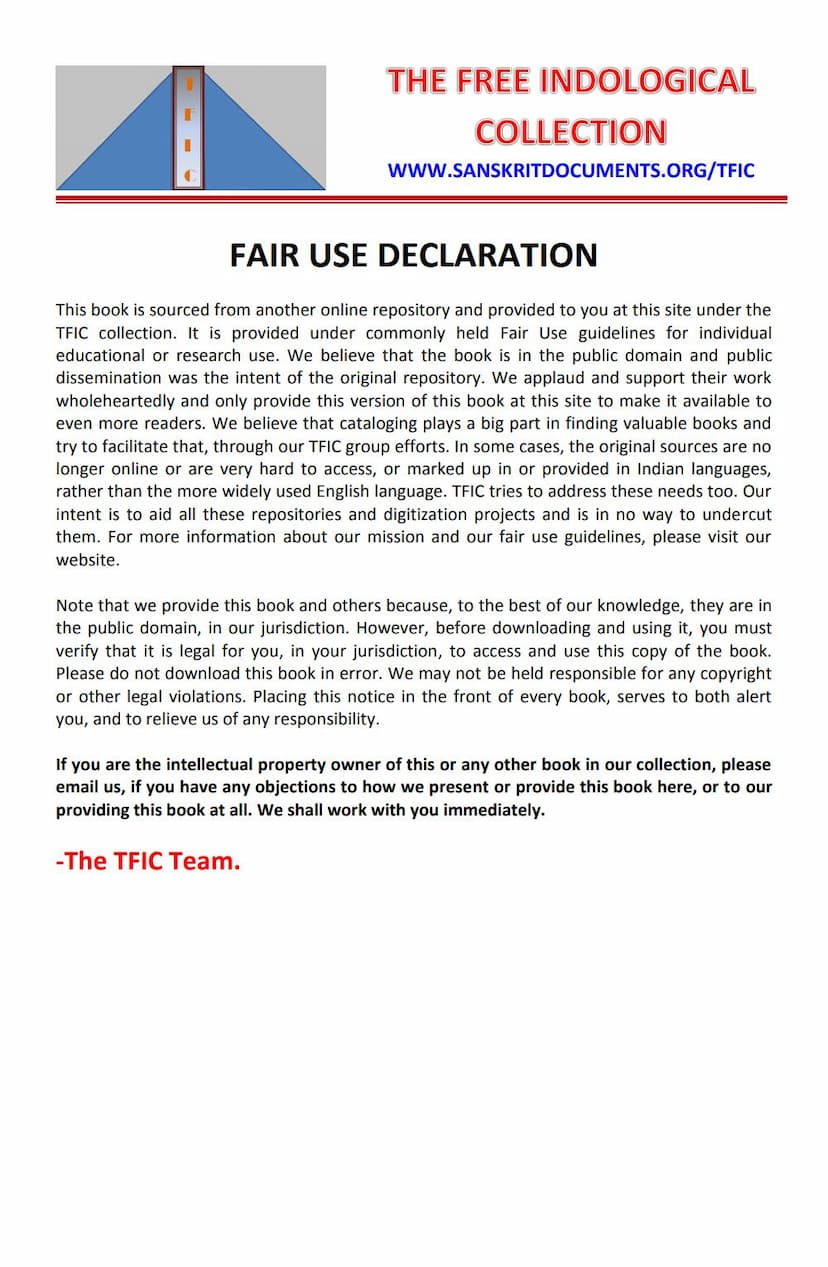Jain Stotra Ratnamala
Added to library: September 2, 2025

Summary
The provided text is a Jain devotional book titled "Jain Stotra Ratnamala" (Collection of Jewel-like Jain Stotras) by Kothari Kasalchand Nimji, published in Veer Samvat 2433 (1963 AD). It contains various Jain prayers, hymns, and stotras, primarily focused on devotion and seeking blessings.
Here's a summary of the content based on the provided pages:
Overall Purpose: The book is a collection of Jain stotras, which are devotional hymns or prayers. It serves as a guide for Jain devotees to recite and meditate upon. The text is presented in Gujarati script, but the language used for the stotras appears to be Prakrit or a similar ancient Indian language, common in Jain scriptures.
Structure and Content: The book begins with a "Fair Use Declaration" from "The Free Indological Collection" (TFIC), emphasizing that the digitized book is for educational and research purposes and is believed to be in the public domain.
The table of contents (अनुक्रमणिका) lists the following stotras or sections:
- Navkar (नवकार): This is the foundational prayer in Jainism, the Navkar Mantra or Namokar Mantra, expressing reverence to the Arhats, Siddhas, Acharyas, Upadhyayas, and all the saints.
- Navsargahar (नवसग्गहरं): This stotra is likely related to warding off negative influences or calamities. The text describes it as dispelling poisons and being a dwelling of well-being.
- Santikar Stotra (संतिकर स्तोत्र): A hymn for peace and well-being. It invokes the Tirthankaras and various divine beings and goddesses for protection.
- Tijaypahuptt Stotra (तिजयपहुत्त स्तोत्र): This stotra seems to be related to protection or overcoming obstacles, mentioning specific numbers of divine beings and their protective powers.
- Namikan Stotra (नमिकण स्तोत्र): Another devotional hymn, likely invoking a Tirthankara, possibly Parshvanatha, for protection and blessings, mentioning the overcoming of diseases, poisons, and other ailments.
- Shri Ajitshanti Stavan (श्री अजितशांति स्तवन): A hymn praising the Tirthankara Ajitanatha and seeking peace.
- Jaktamar Stotra (जक्तामर स्तोत्र): A significant Jain stotra, often attributed to Acharya Kundakunda or other great saints, praising a Tirthankara (often implied to be Parshvanatha or Adinatha) for their divine qualities and seeking protection from worldly suffering and negative influences. The stotra emphasizes the Tirthankara's purity, knowledge, compassion, and power.
- Kalyanmandir Stotra (कल्याणमंदिर स्तोत्र): Another widely recited Jain stotra, often attributed to Acharya Siddhasena Divakara, praising a Tirthankara for being a refuge and offering liberation. It highlights the Tirthankara's divine qualities and the effectiveness of devotion.
- Brihan Shanti Stavan (बृहन्छांति स्तवन): A longer hymn for peace and well-being, likely invoking the Tirthankaras and various divine beings for universal peace and prosperity.
- Jayatihrushan Stotra (जयतिहुश्रण स्तोत्र): A hymn of victory and praise, possibly invoking a Tirthankara for their auspicious qualities.
- Jinpaniar Stotra (जीनपंजर स्तोत्र): This stotra likely refers to a "Jina cage" or protection provided by the Jinas. It is described as a powerful protective mantra or hymn.
- Grahashanti Stotra (ग्रहशांति स्तोत्र): A hymn dedicated to appeasing celestial bodies (planets) and seeking peace, often recited to mitigate astrological afflictions.
- Mantradhiraj Stotra (मंत्राधिराज स्तोत्र): A "king of mantras" stotra, likely a very powerful and revered hymn.
- Rushimangal Stotra (ऋषिमंगल स्तोत्र): A hymn seeking auspiciousness and protection from Rishis (sages).
- Shri Tattvarthasutra Stotra (श्री तत्त्वार्थसूत्र स्तोत्र): This refers to the Tattvartha Sutra, a fundamental Jain philosophical text. While presented as a stotra here, it's essentially the core Jain philosophy summarized. The provided text shows excerpts from its chapters, covering topics like the path to liberation, categories of existence (Jiva, Ajiva, etc.), types of knowledge, celestial beings, soul's nature, karma, and liberation.
Key Themes and Devotion: The stotras collectively express:
- Reverence to Tirthankaras: The central theme is devotion to the omniscient and liberated souls (Tirthankaras), acknowledging their spiritual prowess and compassion.
- Seeking Protection and Peace: Many stotras are recited to ward off evils, diseases, negative influences (grahas, poisons), and to invoke peace and well-being for oneself and the world.
- Liberation (Moksha): The ultimate goal of spiritual practice, liberation from the cycle of birth and death, is often mentioned as the reward for devotion and adherence to Jain principles.
- Virtues: The stotras praise virtues like knowledge, conduct, penance, renunciation, compassion, and non-violence.
- Ritualistic Practices: Some sections detail specific practices or visualizations associated with reciting the stotras, such as placing the names of Tirthankaras in different parts of the body for protection.
- Philosophical Underpinnings: The inclusion of Tattvartha Sutra highlights the philosophical depth of Jainism, covering its cosmology, metaphysics, and ethics.
The book serves as a valuable resource for Jain practitioners, offering a structured way to engage in devotional practices and deepen their understanding of Jain teachings.